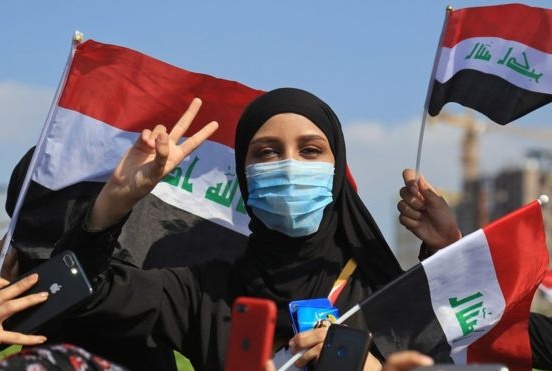Originally written for The Independent:
Protestors in Iraq have once again defied the threat of violence to join mass anti-government demonstrations across the country. Among thousands of citizens taking to the streets to demand an overhaul of the political system are women. After decades of war, violence and sanctions that taken their toll on women in this patriarchal society, it is a remarkable development.
Women have been marginalized and silenced by conservative Islamists for too long and now they have decided to finally make themselves heard. Outraged by the brutal crackdown of unarmed protestors and the horrifying footage of their killings, women have decided enough is enough.
“We want a true homeland – a secular state. We want our money back”, demanded Mariam, a 23-year-old protestor from Baghdad.
Noor, a 20-year-old protestor from Maysan, said she decided to take part in the uprising because she was never satisfied with the status quo: “I can never accept to be ruled by figures whose affiliations are with other countries, following their agendas and self-interests. The true desire in a free homeland is the main reason I have taken to the streets.”
The fact that the demonstrations were leaderless and unaffiliated with any party encouraged other girls to make that decision. Huda, a 29-year-old environmental activist from Baghdad, first feared that the protests could be hijacked like previous years but she was reassured when she realized that this wave of protests did not follow any political agenda.
Poor education was another driving factor. Ola, a secondary school student from Babylon, said: “Our future is unknown and our education suffers from a miserable reality”. Alaa Ghassan, a mechanical engineering student from Baghdad, says her university degree is “worthless in a country that does not provide its citizens with their basic rights”.
Breaking Taboos
Despite often facing disapproval from parents and husbands over fears for their safety, women went the extra mile to protest, sometimes joining demonstrations in secret.
In a society where sexes do not normally mix, protesting side by side with men means a taboo has been broken. Some believe this is a revolution against outdated traditions and norms. For years, “the governments and parties have been trying to silence girls but have failed”, says 31-year-old protestor Aisha.
Mariam and her fiancé Ahmed decided to defy other taboos when they took a photo kissing each another wearing gas masks in Baghdad’s Tahrir Square. The picture went viral on social media but did not go without criticism.
The social norm of calling someone after the names of their fathers was broken when Safaa al-Saray, an influential protestor who was shot dead by a gas canister, was dubbed by his friends as Ibn Thanwa [Son of Thanwa] after his mother’s first name.
Elsewhere the experience has been different. Ola, a 15-year-old secondary school student from Karbala, said she was scorned by some men when she and a group of girls chanted against Islamists. A human rights defender, also from Karbala, says she experienced a similar backlash after joining protests.
“We were few so we were not taken seriously”, she said. However, she added that this later changed when students’ strikes added momentum to the female participation in the demonstrations.
Belonging and Pride
The massive participation in the protests across Iraq brought a strong sense of belonging and pride for women. In Baghdad, in particular, Tahrir Square has become a smaller Iraq where people are creating a collective community, healing their wounds, re-claiming their national identities, and re-writing their current history beyond sectarianism, chaos, divisions, and fears.
The abandoned building known as the Turkish restaurant where protestors have taken full control to protect it from snipers has become an icon symbolizing Iraq’s unity.
The protests have given people hope for the future of Iraq and that sense of belonging motivated women of all ages to take part in different activities in the squares where protests were held: from donation collections to cleaning campaigns, cooking, baking and holding vigils to remember those killed. Similarly, doctors, dentists and pharmacists have been camping for days in Tahrir to provide medical services to protestors.
There is no doubt that the uprising is a turning point for women but the road to their freedom and rights is still filled with obstacles. The lives of Iraqi women are constantly threatened by militias and tribes. Last year, a number of female activists and social media figures were killed. In early October, a female activist was assassinated with her husband in her house.
As the protest entered its second month, female activist and medic Saba al-Mahdawi was abducted on her way home by a group of men. Her abduction sent a frightening message to other protestors and activists who saw this as an attempt to intimidate them into submission and silence. Other girls also said they are receiving threats warning them against protesting.
But women are not giving up and refuse to be silenced. A new generation is rising from the ashes and there is no turning back now. Haneen, a 20-year-old student from Babylon said: “We are the future generation. As children, we lived through the fall of a former regime and its aftermath. As teens, we lived through terrorism and ISIS. As youth, we have been living through failed governments, stealing our rights and the rights of our children. The time has come for us to speak out against all of this.”

